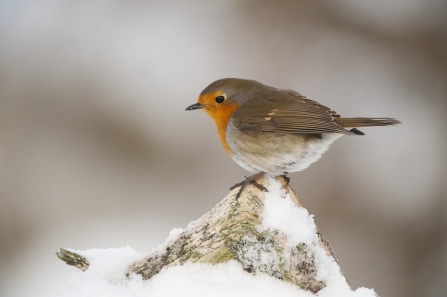
Robin. Image by: Mark Hamblin/2020VISION.

Robin. Image by: Mark Hamblin/2020VISION.
Snatching an afternoon, and wrapping up head-to-toe in thermal gear, I was keen to brave the beast and discover how life outdoors was coping with the chill. For this, Cresswell Pond seemed like an obvious candidate for the trip – seldom frozen and boasting an eclectic mix of habitat types rife with wildlife.
Arriving at the reserve, I opted first for a scan of the burnside and beach immediately adjacent to the lagoon: to much success. Here, amid the queer swirling mixture of sand and fresh snow, multiple small birds fed among the wrack. Some, a few rock pipit and pied wagtail, were to be expected, yet others – the meadow pipits, skylarks and linnet adorning the beach in loose accumulations – were more surprising. Birds of farmland forced out of their traditional abodes by the snow and doing their best to etch out a meal from amid the sand and seaweed. The largely brown mass of feeding birds contrasting with the vibrancy of a male stonechat as it dropped briefly onto the sands – doubtless to snag an unsuspecting sand-hopper or insect.
On the reserve itself, it became clear that the bad weather has had no significant impact on the multitude of waterfowl using the site. Indeed, wigeon, teal, gadwall and mallard thronged around the lagoon margins and, on deeper waters, tufted duck fed undeterred by the weather. Joined, on this occasion, by a single drake pochard – rusted orange tones providing a welcome touch of warmth against the cold whites and greys of the wider landscape. The bird in question drifting further out as an unseen presence spooked the birds on the west shore; startling everything in sight into flight in a flurry of flapping and perturbed whistles.
A fox – a regular feature of the reserve who, today, moved along the snow-clad shoreline with something plump and brown clasped between it’s jaws. What it was, I do not know; though the fox looked content with its prize – paying no heed to the clamouring birds taking to the air in it’s path. For a scavenger such as this, such weather presents fewer problems. The body-count increasing as the cold descends providing ample opportunity to find carrion or pick off the frozen, injured or dying. Unsurprisingly perhaps, this particular fox appeared quite healthy.
On subject of hardship, it was exciting to see the sites diligently maintained bird-feeders jampacked with life. The provision of food here doubtless providing a vital lifeline for many of species worst affected by inclement weather. Indeed, during a fifteen-minute stint at the feeders, no less than twenty tree sparrows were seen. Vying for position with a handful of radiant yellowhammer, a scattering of goldfinch and a lone greenfinch. The latter always great to see in recent times, given the precarious state of the wider population. On the ground, a dunnock fed on the morsels cascading down from the scrum overhead, doubtless grateful for the assistance provided by the finches, sparrows and buntings.
Departing the site and doing my best to walk on frozen feet, a pair of grey partridge were observed scratching in the snow beside the farm cottage. Kicking up faint plumes of white as they searched for food. I do hope they found some: species such as this, reliant on foods found at ground level, are often those hardest hit by bad weather. And while these two beauties appeared relatively unscathed by the elements, for now, I do not fancy their chances should conditions such as this continue.
For those looking to visit Cresswell Pond via public transport, you can take the Arriva 1 service running between Blyth and Widdrington, or for the braver among us, take the x18 service to Widdrington Village and enjoy a (snowy) walk from there.